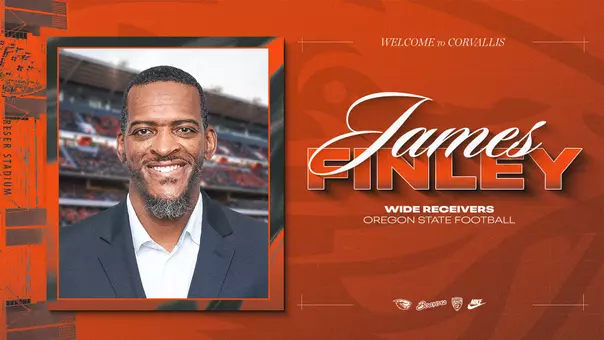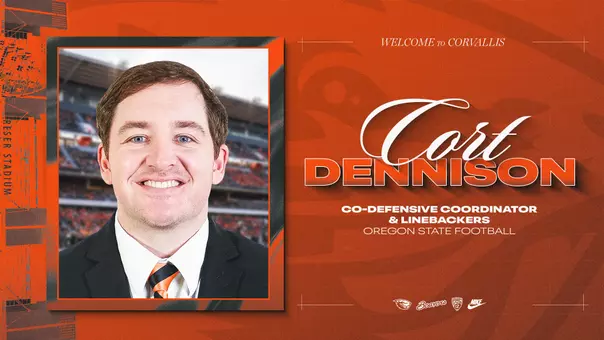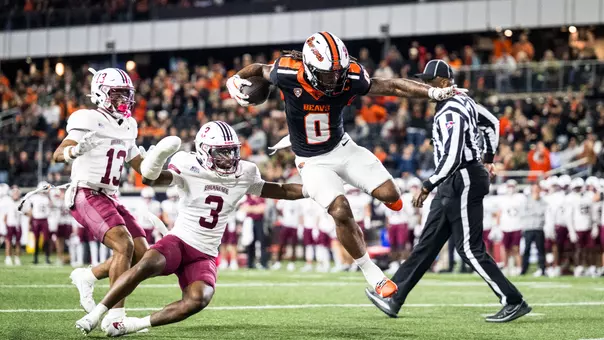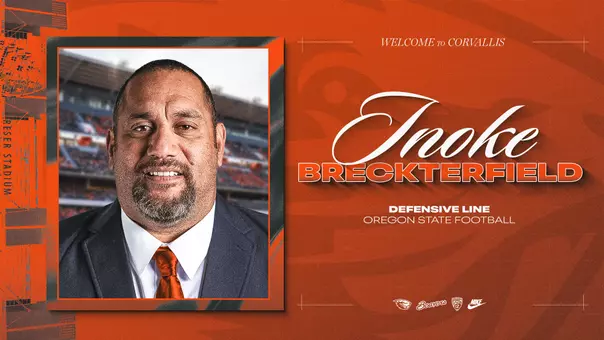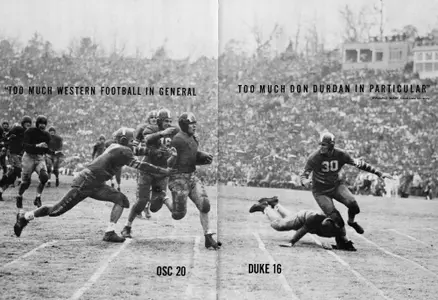
Remembering the Men of Roses -- "This Campus and Town are Burning with Football Fever"
October 26, 2016 | Football
This is the third installment of a seven-part series written by Kip Carlson about the 1941 Oregon State football team that played in the 1942 Rose Bowl. The '42 Rose Bowl is the only one in the history of the storied game that was played outside of Southern California due to fears of an attack on the U.S. West Coast following Pearl Harbor.
This story first appeared in this year's football game-day program Saturday, Oct. 8 vs. California.
Oregon State University will honor the "Men of Roses" throughout the week leading up to the culmination of events this Saturday night when the Beavers host Washington State at Reser Stadium.
As the last week of November, 1941 hit the calendar, Oregon State had a lot to be thankful for.
After being slated for the lower division of the Pacific Coast Conference in preseason prognostications, the Beavers had knocked off favorites Washington and Stanford on back-to-back October Saturdays. Now they hadn't allowed a point during November, shutting out Idaho, UCLA, California and Montana in succession.
OSC and Stanford were tied in the Pacific Coast Conference football standings, each with two losses. The Beavers, having beaten Stanford, seemed assured their first-ever Rose Bowl berth if they returned from Eugene on November 29 with a win over Oregon.
But it wasn't guaranteed.
At the time, the PCC's Rose Bowl representative was selected by a vote of the conference schools. So, even if Oregon State defeated Oregon, results of other games could make a case for voting in Stanford or Washington State.
It was unlikely, though, the Beavers would be left home if they beat the Ducks. Wrote Davis Walsh of the Los Angeles Examiner on November 24: "No matter what Stanford should or is able to do against Cal, this Saturday, Oregon State will undoubtedly go to the Rose Bowl if it can win its finale from its bellicose, internecine rival, i.e., Oregon, the same afternoon."
Continued Davis, who a week earlier had been championing Stanford for the berth: "The records, to be frank about it, run strongly against the claims made here a week ago. They, the records, show Oregon State to be the better November team, which is the basis on which a Bowl choice should be made."
It wasn't going to be easy. Oregon entered the game with three losses but had been viewed early in the season as quite dangerous. After the Ducks beat Washington 19-16 in Seattle the week before the Civil War, Washington head coach Jim Phelan said, "That team has the finest material I have seen on any coast squad this season – how did they lose a game?"
A midweek story in The Oregonian described the scene in Corvallis as one in which "this campus and town are burning with football fever, and temperatures are soaring higher by the hour, but those responsible for all the fuss are calm and collected."
Oregon State head coach Lon Stiner, his staff and the Beaver players were calm, the story said, and while Corvallis residents were willing to bet Oregon State would win, Stiner rated the game a tossup. Wrote Pat Frizzell of Stiner's outlook: "'We have all the greatest respect for the University of Oregon team,' the affable Beaver boss said as he puffed his pipe in the men's gymnasium Tuesday afternoon, 'and we're working hard. We're going to play the best game we know how Saturday and that's about all that can be said.'"
A rally was planned for campus on Wednesday afternoon. Stiner also mentioned how the immense statewide interest in the game was resulting in some offbeat offers. First, there was the gross of blood-boosting pep pills one company offered his team; it was declined. Then there was the plan one fan sent Stiner and Oregon head coach Tex Oliver suggesting post-game ceremony in which both teams form "sort of a ring-around-the-rosy" on field to "show good feeling and calm people off, and such," Stiner said. "He sent us a little diagram – little squares marking where Tex and I have to stand, and a spot for the graduate manager (athletic director), too. Guess he overlooked the presidents of the schools …
"It might be a darn good idea, but somehow I can't quite visualize holding the boys for all this after such a hard football game, so I haven't rung up Tex about it, nor have we adopted the plan ourselves."
Stiner was too busy worrying about how the weather might affect Oregon Stage's offense, which relied upon the running and passing of halfbacks Don Durdan, from Eureka, Calif., and Bob Dethman, from Hood River, and the Beavers' innovative "shifting" defense, in which players changed position up until the snap to confuse the opposing offense. A November cold snap had given way to rain, and the Hayward Field turf would be wet and choppy.
By Friday, all 20,500 seats at Hayward Field had been sold and all lodging in Eugene had been taken. Tickets near midfield were being scalped for up to $15 per pair.
Saturday brought gray skies but no rain, and the Hayward Field turf was indeed soggy. At kickoff, the Beavers were rated 5-to-4 favorites by the gambling set.
The first half ended 0-0. There was only one real scoring threat, as the Beavers had a fourth-and-goal from the Duck 1 but were stopped short of the end zone.
Early in the third quarter, Oregon State forced a punt and Dethman returned the ball 15 yards to the Oregon 38. Durdan's 11-yard pass to George Zellick, from Lewiston, Mont., helped move the ball to the 18, then a 15-yard penalty for unnecessary roughness against the Ducks placed the ball at the 3. After Dethman and Durdan were each stopped for no gain, fullback Choc Shelton, from Union, carried over right guard for the touchdown.
"I knew I had to make it, so I did," Shelton said. "I looked up once and saw that goal line, and, while everything was over in a hurry, I remember thinking it was vital I cross that white stripe." Warren Simas, from Arcata, Calif., had his conversion kick blown wide by a stiff wind and the score stayed 6-0, Oregon State, with seven minutes remaining third quarter.
To open the fourth quarter, Oregon had the ball at its own 47. Halfback Curt Mecham ran left, cocking his arm as if to pass, then outraced OSC's defenders to the sideline. He cut back to the middle of the field, evaded the Beaver secondary and scored; his 53-yard run and Jimmy Newquists's conversion kick gave Oregon a 7-6 lead with 14:45 to play in the game.
After ensuing kickoff, the teams traded punts and Oregon State took the ball at its own 40-yard line, looking for the score that would send it to Pasadena.
Durdan passed to Zellick for nine yards. After an incompletion, substitute fullback Joe Day, from Seaside, plunged for the first down at midfield. Durdan hit George Peters in the left flat for 13 yards, then ran for nine more to the Oregon 28.
Then the Beavers really had their Day.
Day bucked through the line and found nothing but open space. He got past one Duck pursuer at the 5 and went into the end zone. Simas' kick was blocked, but the Beavers had a 12-7 lead with 11:40 to go.
The Oregonian gave captain-for-the-day Dethman's evaluation of the crucial stretch: "'I just knew we'd take them, even when they went ahead, 7 to 6,' Ruddy Robert explained. 'I could tell by the way they acted in the huddle. Their eyes were all but popping out of their heads and they gritted their teeth as though inspired by some atavistic urge.
"'You just can't beat down spirit like that, and, sure enough, good old Joe Day came through with the winning run.'
"The lad he mentioned was busy wiping sweat from his brow and had little to say, letting a pleased grin take the place of any comment."
Oregon State's defense wouldn't let the lead slip away again. In the final minute, as the day's first rain fell, the Beavers had the ball on the Duck 7, poised to score again, but let the clock run out.
Even now, Stiner – whose team had outgained the Ducks 325-158 – wouldn't take the Rose Bowl bid for granted, even though Stanford had been beaten by California that afternoon.
"We'll accept the Rose Bowl invitation if we get it. Don't ask me who we'll choose for an opponent - I don't want to put the cart in front of the horse," Stiner shouted to reporters in the Beavers' jubilant postgame locker room.
Another aspect of that era's Rose Bowl selection process was that the PCC representative selected its opponent. In recent weeks, speculation on the Beavers' potential foe included Texas, Texas A&M, Missouri, Fordham, Duquesne and Duke, among others.
By early Saturday evening, PCC President C.V. Ruzek, an OSC professor, made the announcement: Oregon State had been elected by its fellow conference schools to represent them in the Rose Bowl. Word of the selection set off wild celebrations in Corvallis and among Beaver boosters all around the state.
On Sunday, as celebrations continued, Oregon State announced its choice: Duke. Said OSC athletic director Percy Locey, "Oregon State College considered all available teams with records for the Rose Bowl game. Feelers were sent to several colleges but Duke was selected as the team having the best record of any school."
The Blue Devils were ranked second in the nation behind Minnesota, but it would be several years before the Big Ten allowed its teams to play in bowl games. Duke was 9-0-0 and no team had come within 13 points of it during the season; it had outscored its opponents 311-41.
The Beavers' first trip to Pasadena would be no bed of roses.
NEXT: The Celebration Dims, and Plans Change.
This story first appeared in this year's football game-day program Saturday, Oct. 8 vs. California.
Oregon State University will honor the "Men of Roses" throughout the week leading up to the culmination of events this Saturday night when the Beavers host Washington State at Reser Stadium.
As the last week of November, 1941 hit the calendar, Oregon State had a lot to be thankful for.
After being slated for the lower division of the Pacific Coast Conference in preseason prognostications, the Beavers had knocked off favorites Washington and Stanford on back-to-back October Saturdays. Now they hadn't allowed a point during November, shutting out Idaho, UCLA, California and Montana in succession.
OSC and Stanford were tied in the Pacific Coast Conference football standings, each with two losses. The Beavers, having beaten Stanford, seemed assured their first-ever Rose Bowl berth if they returned from Eugene on November 29 with a win over Oregon.
But it wasn't guaranteed.
At the time, the PCC's Rose Bowl representative was selected by a vote of the conference schools. So, even if Oregon State defeated Oregon, results of other games could make a case for voting in Stanford or Washington State.
It was unlikely, though, the Beavers would be left home if they beat the Ducks. Wrote Davis Walsh of the Los Angeles Examiner on November 24: "No matter what Stanford should or is able to do against Cal, this Saturday, Oregon State will undoubtedly go to the Rose Bowl if it can win its finale from its bellicose, internecine rival, i.e., Oregon, the same afternoon."
Continued Davis, who a week earlier had been championing Stanford for the berth: "The records, to be frank about it, run strongly against the claims made here a week ago. They, the records, show Oregon State to be the better November team, which is the basis on which a Bowl choice should be made."
It wasn't going to be easy. Oregon entered the game with three losses but had been viewed early in the season as quite dangerous. After the Ducks beat Washington 19-16 in Seattle the week before the Civil War, Washington head coach Jim Phelan said, "That team has the finest material I have seen on any coast squad this season – how did they lose a game?"
A midweek story in The Oregonian described the scene in Corvallis as one in which "this campus and town are burning with football fever, and temperatures are soaring higher by the hour, but those responsible for all the fuss are calm and collected."
Oregon State head coach Lon Stiner, his staff and the Beaver players were calm, the story said, and while Corvallis residents were willing to bet Oregon State would win, Stiner rated the game a tossup. Wrote Pat Frizzell of Stiner's outlook: "'We have all the greatest respect for the University of Oregon team,' the affable Beaver boss said as he puffed his pipe in the men's gymnasium Tuesday afternoon, 'and we're working hard. We're going to play the best game we know how Saturday and that's about all that can be said.'"
A rally was planned for campus on Wednesday afternoon. Stiner also mentioned how the immense statewide interest in the game was resulting in some offbeat offers. First, there was the gross of blood-boosting pep pills one company offered his team; it was declined. Then there was the plan one fan sent Stiner and Oregon head coach Tex Oliver suggesting post-game ceremony in which both teams form "sort of a ring-around-the-rosy" on field to "show good feeling and calm people off, and such," Stiner said. "He sent us a little diagram – little squares marking where Tex and I have to stand, and a spot for the graduate manager (athletic director), too. Guess he overlooked the presidents of the schools …
"It might be a darn good idea, but somehow I can't quite visualize holding the boys for all this after such a hard football game, so I haven't rung up Tex about it, nor have we adopted the plan ourselves."
Stiner was too busy worrying about how the weather might affect Oregon Stage's offense, which relied upon the running and passing of halfbacks Don Durdan, from Eureka, Calif., and Bob Dethman, from Hood River, and the Beavers' innovative "shifting" defense, in which players changed position up until the snap to confuse the opposing offense. A November cold snap had given way to rain, and the Hayward Field turf would be wet and choppy.
By Friday, all 20,500 seats at Hayward Field had been sold and all lodging in Eugene had been taken. Tickets near midfield were being scalped for up to $15 per pair.
Saturday brought gray skies but no rain, and the Hayward Field turf was indeed soggy. At kickoff, the Beavers were rated 5-to-4 favorites by the gambling set.
The first half ended 0-0. There was only one real scoring threat, as the Beavers had a fourth-and-goal from the Duck 1 but were stopped short of the end zone.
Early in the third quarter, Oregon State forced a punt and Dethman returned the ball 15 yards to the Oregon 38. Durdan's 11-yard pass to George Zellick, from Lewiston, Mont., helped move the ball to the 18, then a 15-yard penalty for unnecessary roughness against the Ducks placed the ball at the 3. After Dethman and Durdan were each stopped for no gain, fullback Choc Shelton, from Union, carried over right guard for the touchdown.
"I knew I had to make it, so I did," Shelton said. "I looked up once and saw that goal line, and, while everything was over in a hurry, I remember thinking it was vital I cross that white stripe." Warren Simas, from Arcata, Calif., had his conversion kick blown wide by a stiff wind and the score stayed 6-0, Oregon State, with seven minutes remaining third quarter.
To open the fourth quarter, Oregon had the ball at its own 47. Halfback Curt Mecham ran left, cocking his arm as if to pass, then outraced OSC's defenders to the sideline. He cut back to the middle of the field, evaded the Beaver secondary and scored; his 53-yard run and Jimmy Newquists's conversion kick gave Oregon a 7-6 lead with 14:45 to play in the game.
After ensuing kickoff, the teams traded punts and Oregon State took the ball at its own 40-yard line, looking for the score that would send it to Pasadena.
Durdan passed to Zellick for nine yards. After an incompletion, substitute fullback Joe Day, from Seaside, plunged for the first down at midfield. Durdan hit George Peters in the left flat for 13 yards, then ran for nine more to the Oregon 28.
Then the Beavers really had their Day.
Day bucked through the line and found nothing but open space. He got past one Duck pursuer at the 5 and went into the end zone. Simas' kick was blocked, but the Beavers had a 12-7 lead with 11:40 to go.
The Oregonian gave captain-for-the-day Dethman's evaluation of the crucial stretch: "'I just knew we'd take them, even when they went ahead, 7 to 6,' Ruddy Robert explained. 'I could tell by the way they acted in the huddle. Their eyes were all but popping out of their heads and they gritted their teeth as though inspired by some atavistic urge.
"'You just can't beat down spirit like that, and, sure enough, good old Joe Day came through with the winning run.'
"The lad he mentioned was busy wiping sweat from his brow and had little to say, letting a pleased grin take the place of any comment."
Oregon State's defense wouldn't let the lead slip away again. In the final minute, as the day's first rain fell, the Beavers had the ball on the Duck 7, poised to score again, but let the clock run out.
Even now, Stiner – whose team had outgained the Ducks 325-158 – wouldn't take the Rose Bowl bid for granted, even though Stanford had been beaten by California that afternoon.
"We'll accept the Rose Bowl invitation if we get it. Don't ask me who we'll choose for an opponent - I don't want to put the cart in front of the horse," Stiner shouted to reporters in the Beavers' jubilant postgame locker room.
Another aspect of that era's Rose Bowl selection process was that the PCC representative selected its opponent. In recent weeks, speculation on the Beavers' potential foe included Texas, Texas A&M, Missouri, Fordham, Duquesne and Duke, among others.
By early Saturday evening, PCC President C.V. Ruzek, an OSC professor, made the announcement: Oregon State had been elected by its fellow conference schools to represent them in the Rose Bowl. Word of the selection set off wild celebrations in Corvallis and among Beaver boosters all around the state.
On Sunday, as celebrations continued, Oregon State announced its choice: Duke. Said OSC athletic director Percy Locey, "Oregon State College considered all available teams with records for the Rose Bowl game. Feelers were sent to several colleges but Duke was selected as the team having the best record of any school."
The Blue Devils were ranked second in the nation behind Minnesota, but it would be several years before the Big Ten allowed its teams to play in bowl games. Duke was 9-0-0 and no team had come within 13 points of it during the season; it had outscored its opponents 311-41.
The Beavers' first trip to Pasadena would be no bed of roses.
NEXT: The Celebration Dims, and Plans Change.
Introducing Oregon State Head Coach JaMarcus Shephard
Monday, December 01
Oregon State Football Interviews: November 25, 2025
Tuesday, November 25
Oregon State Football Press Conference: Interim Head Coach Robb Akey (Nov. 24, 2025)
Monday, November 24
Oregon State Football Interviews: November 12, 2025
Wednesday, November 12



